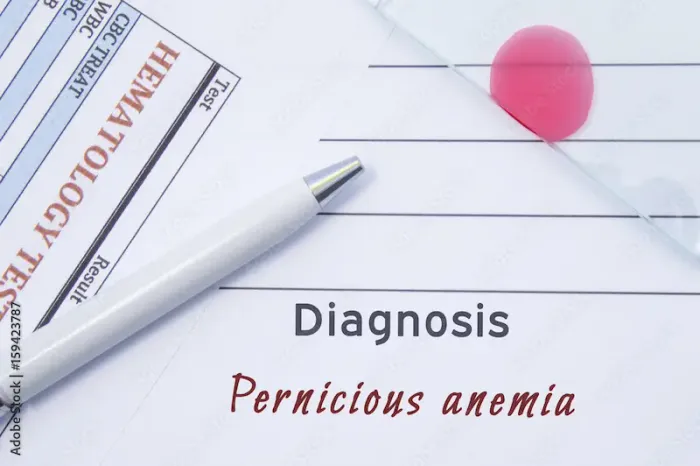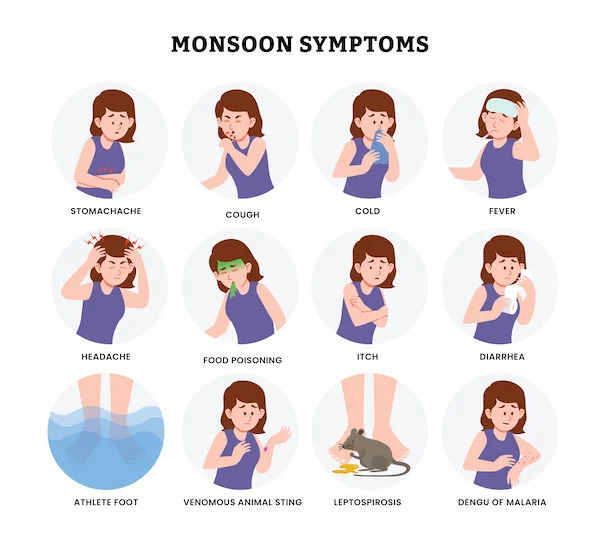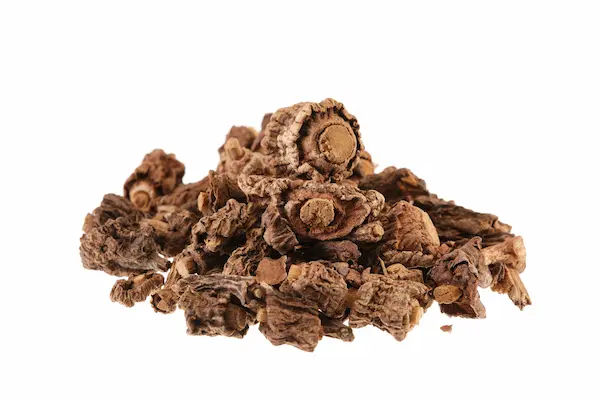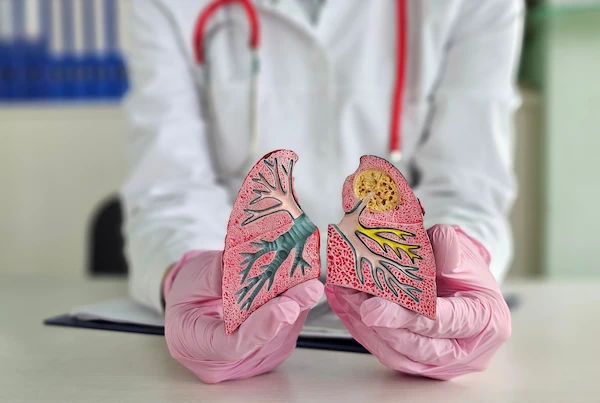Symptoms, Causes, and Treatment of Pernicious Anaemia
Know about the pernicious anaemia, symptoms, causes, diagnosis, and treatment options. Learn about the lifestyle tips for managing pernicious anaemia.

Written by Dr. Mohammed Kamran
Reviewed by Dr. Dhankecha Mayank Dineshbhai MBBS
Last updated on 26th Aug, 2025

Introduction
Pernicious anaemia is a type of vitamin B12 deficiency anaemia that occurs when the body cannot absorb enough vitamin B12 from food due to a lack of intrinsic factor, a protein made in the stomach. This condition can lead to fatigue, weakness, and other health complications if left untreated.
In this article, we’ll explore the symptoms, causes, and treatment options for pernicious anaemia in simple terms, helping you understand how to manage this condition effectively.
What Are the Symptoms of Pernicious Anaemia?
Pernicious anaemia develops slowly, and its symptoms may be mild at first but worsen over time. Common signs include:
• Fatigue and weakness – Feeling unusually tired even after rest.
• Pale or yellowish skin – Due to a lack of healthy red blood cells.
• Shortness of breath – Especially during physical activity.
• Dizziness or lightheadedness – Due to low oxygen levels in the blood.
• Cold hands and feet – Poor circulation caused by anaemia.
• Headaches – Frequent or persistent headaches.
• Heart palpitations – Feeling like your heart is racing or skipping beats.
Neurological Symptoms (Due to B12 Deficiency)
Since vitamin B12 is essential for nerve function, long-term deficiency can lead to:
• Tingling or numbness in hands and feet (like "pins and needles").
• Difficulty walking or balance problems.
• Memory loss or confusion.
• Mood changes, such as depression or irritability.
If you experience these symptoms, it’s important to consult a doctor for proper diagnosis and treatment.
Consult General Practitioner for Personalised Advice
What Causes Pernicious Anaemia?
Pernicious anaemia is primarily caused by the body’s inability to absorb vitamin B12, which happens due to:
1. Lack of Intrinsic Factor
• Intrinsic factor is a protein made in the stomach that helps absorb vitamin B12.
• In pernicious anaemia, the immune system mistakenly attacks stomach cells that produce intrinsic factor, leading to its deficiency.
2. Autoimmune Condition
• Pernicious anaemia is often linked to autoimmune gastritis, where the immune system damages stomach lining cells.
3. Other Risk Factors
• Age: More common in people over 60.
• Family history: Genetics may play a role.
• Certain medical conditions, Such as type 1 diabetes, thyroid disorders, or other autoimmune diseases.
• Stomach surgery: If part of the stomach is removed, intrinsic factor production may decrease.
How Is Pernicious Anaemia Diagnosed?
If your doctor suspects pernicious anaemia, they may recommend:
1. Blood Tests
• Vitamin B12 levels (low in pernicious anaemia).
• Complete blood count (CBC) to detect anaemia.
• Intrinsic factor antibodies (present in most cases).
2. Schilling Test (Less Common Now) – Measures B12 absorption.
3. Bone Marrow Test (Rarely Needed) – To rule out other blood disorders.
Get Your Health Assessed
Early diagnosis is crucial to prevent complications like nerve damage.
Treatment Options for Pernicious Anaemia
Since pernicious anaemia is caused by poor B12 absorption, treatment focuses on replenishing vitamin B12 levels.
1. Vitamin B12 Injections (Most Common Treatment)
• Given as intramuscular shots (usually in the arm or thigh).
• Initially, injections may be frequent (daily or weekly), then monthly for life.
• Helps bypass the digestive system, ensuring direct absorption.
2. High-Dose Oral B12 Supplements
• For mild cases or if injections are not preferred.
• Must be taken regularly as prescribed.
3. Dietary Changes
While diet alone cannot cure pernicious anaemia (since absorption is the issue), eating B12-rich foods can support overall health:
• Animal sources: Meat, fish, eggs, dairy.
• Fortified foods: Some cereals, plant-based milk, and nutritional yeast.
4. Managing Complications
• Nerve damage may require additional treatments like physical therapy.
• Regular follow-ups with a doctor to monitor B12 levels and overall health.
Living with Pernicious Anaemia: Tips for Better Health
While pernicious anaemia is a lifelong condition, proper treatment can help you lead a healthy life.
Here are some tips:
• Stick to Your Treatment Plan – Don’t skip B12 injections or supplements.
• Eat a Balanced Diet – Include B12-rich foods if possible.
• Monitor Symptoms – Report any new or worsening symptoms to your doctor.
• Avoid Alcohol & Smoking – These can worsen B12 absorption.
• Stay Active – Gentle exercise can help with fatigue and circulation.
When to See a Doctor?
If you experience persistent fatigue, numbness, or other symptoms mentioned earlier, consult a doctor. Early treatment can prevent serious complications like nerve damage or heart problems.
Final Thoughts
Pernicious anaemia is a manageable condition with the right treatment. By understanding its symptoms, causes, and treatment options, you can take proactive steps to stay healthy. If you or a loved one shows signs of B12 deficiency, don’t hesitate to seek medical advice.
Consult General Practitioner for Personalised Advice
Consult General Practitioner for Personalised Advice

Dr. Anand Ravi
General Physician
2 Years • MBBS
Bengaluru
PRESTIGE SHANTHINIKETAN - SOCIETY CLINIC, Bengaluru

Dr Syed Mateen Pasha
General Physician
2 Years • MBBS
Bengaluru
PRESTIGE SHANTHINIKETAN - SOCIETY CLINIC, Bengaluru

Dr. Syed Ismail Ali
General Practitioner
7 Years • MBBS
Hyderabad
Apollo 24|7 Clinic, Hyderabad
Dr. Gaddam Manoj
General Practitioner
1 Years • MBBS
Hyderabad
Aaradhya clinic, Hyderabad

Dr. Madhuri Sai Sreepada
General Practitioner
9 Years • MBBS
Hyderabad
BRIGHT SMILES MEDICARE & DENTAL CARE, Hyderabad
Consult General Practitioner for Personalised Advice

Dr. Anand Ravi
General Physician
2 Years • MBBS
Bengaluru
PRESTIGE SHANTHINIKETAN - SOCIETY CLINIC, Bengaluru

Dr Syed Mateen Pasha
General Physician
2 Years • MBBS
Bengaluru
PRESTIGE SHANTHINIKETAN - SOCIETY CLINIC, Bengaluru

Dr. Syed Ismail Ali
General Practitioner
7 Years • MBBS
Hyderabad
Apollo 24|7 Clinic, Hyderabad
Dr. Gaddam Manoj
General Practitioner
1 Years • MBBS
Hyderabad
Aaradhya clinic, Hyderabad

Dr. Madhuri Sai Sreepada
General Practitioner
9 Years • MBBS
Hyderabad
BRIGHT SMILES MEDICARE & DENTAL CARE, Hyderabad







